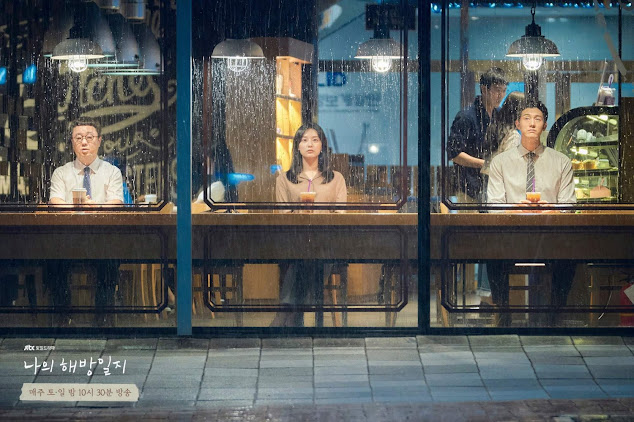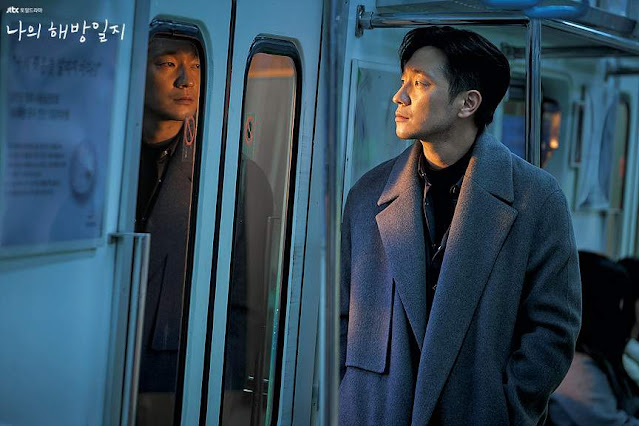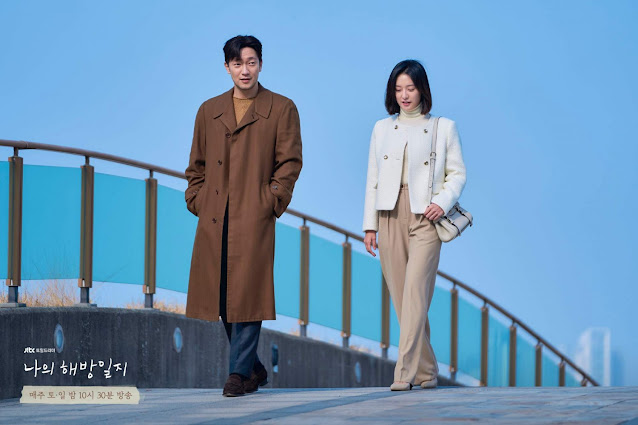I almost gave up at around episode 3 because it was tiring waiting for the father and Gu (one day, suddenly realised I'd seen Son Suk-ku before!) to say something. I’m glad I stuck with it, though I think it was only around episode 7 that the two men opened their mouths more!
A mature script, with mature characters and actors, on mature matters, it makes the other shows I watch feel like they are fairy tales and somewhat silly! I found it more character study than ‘drama’, well scripted, well performed, well filmed and well put together, supported by a gentle yet soulful soundtrack. There were times when I was practically holding my breath because of its artistry.
Character study
First, the characters I didn’t like. That’s mainly father Yeom (Chun Ho-jin). So grumpy the whole time and never conversing properly with his family, not even answering his wife’s straightforward questions. His expectations and constant disapproval hold everyone back, so the siblings are stuck with their tedious daily commute between village and city (the sisters still sharing a bedroom in their thirties and the whole family sharing one bathroom!), not allowed to buy a car, not allowed to take over a lucrative business, have to help in the low-tech farming on weekends and so on. I blame him for their hang-ups and their mother’s frustrations. Chang-hee (Lee Min-ki) rightfully grumbles that he cares more about Gu than his own son (children).
The other character who didn’t appeal to me was Hyun-a (Jeon Hye-jin). No doubt, she’s a fiercely loyal friend, always supporting Chang-hee and Mi-jeong (Kim Ji-won), and especially in accompanying her EX-boyfriend (Jung Won-jo) through his illness. She also plays the important role of the prototype of the village person who has moved to Seoul, with her messy love and work life. A significant secondary character for sure, but I just didn’t warm to her.
The mother (Lee Kyung-seong) was mostly too two-dimensional, only becoming more ‘human’ towards her end. She complains about her children driving her up the wall, but no, she was just saying it. She reminisces fondly about little Chang-hee, is delighted for Gi-jeong (Lee El) when she sees Tae-hoon (Lee Ki-woo), and bawls privately when she hears about Mi-jeong crying her eyes out after Gu left.
The friends and workmates are well written and portrayed too. Special mention for village pals Do-hwan (Han Sang-jo) and Jeong-hoon (Jo Min-kook), Mr Park who flirts with every female colleague but Gi-jeong and ends up a good friend who gives her relationship advice (I think he likes her by that point but strangely, disappears from the show towards the end), Tae-hoon’s wonderful middle sister Kyung-sun (Jung Soo-young) and of course the Liberation Club members!
 |
| found it strange that a company requires employees to join a 'club' -- these three, with their anti-social leanings, manage to work around the requirements! |
From the behind the scenes videos, it strikes me that Lee El is the least outgoing of the lot but she pulls off Gi-jeong very well, the most openly emotional of the three, the one who can’t stop talking when she should – a sparkly character who stands apart in their village setting.
Chang-hee is full of passion and so giving, but his lines sometimes become mini monologues. So sweet how he cares for Hyun-a’s ex-boyfriend. His crowning moment must be holding hyung Hyuk-soo’s hand as he dies. However, I felt that ‘funeral director’ wasn’t the best job for him – it would interest him, he will do well as one but he’d be wonderful as a nurse or counsellor. I last saw Min-ki more than ten years ago and his acting has improved!
Mi-jeong is seemingly boring and meek because she is quiet but actually sensitive, creative, principled (i.e. stubborn) and fearless. We wish she would put her foot down more assertively with the ex-boyfriend who saddled her with that huge debt and her horrid work supervisor but she chooses not to. Sometimes, it felt like she is just torturing herself by keeping these burdens.
Now, talk about a messy life. Hyun-a’s cannot compete with Gu’s. We don’t know his background but I thought that he has problems because he’s in the wrong job. He’s good at chasing debts, threatening people, fighting and so on but that’s not really him. He’s very compassionate – he feeds the wild dogs and brings them that big umbrella for shade when even Mi-jeong wouldn’t hesitate to fight them. That’s why the job and the swanky club scene have eaten away his insides, not to mention his ex-girlfriend’s suicide after he had tried to talk her into going for therapy. No wonder he is content with working in the fields and making those sinks and cabinets. Why does he go back to work for Boss Shin? I’ll save my theory about it for the end!
 |
| that club with its folded up porch (how do I even describe it?) is stunning! |
 |
| his acting is stunning too! |
These four give us strong, emotive performances and I thought they all deserved awards but only Lee Ki-woo (Rookie from back in 2007!) won an acting award for this show. I didn’t think it was that challenging playing Tae-hoon. He is a mildly complicated character, trapped in his family life by the circumstances. It was nice to see him smiling more at the end and giving his “heart” (the rose) to Gi-jeong. I loved how he explains to his daughter (Kang Joo-ha) that he is happy when he is with this ajumma, and doesn’t feel the need to be anyone but his boring self.
 |
| you know A-pa is not the most exciting person, right? |
Relationships
Best if Tae-hoon could be free of the eldest sister (Kim Ro-sa). His daughter seems ok with Gi-jeong. She says “that’s good” when her dad explains why he likes Gi-jeong and she quips in their on-nearly-mute ‘family discussion’ while the priest is preaching that they should just get married! There was a lost opportunity for Gi-jeong, though. When the teary girl asks, ‘do adults also cry when they lose their mothers’, Gi-jeong should have engaged her on that emotional level instead of saying ‘I can be your mother too’. Such a wasted moment! At the end, I was glad that Tae-hoon made up his mind to push on with Gi-jeong. They’ll stay together.
 |
| their R&J scene! |
I thought it was clear that Mi-jeong and Gu will be together but I saw online that people wondered if they carried on. He says – you be my therapist, we’ll have ten sessions, then another ten if I have more to unload, and we’ll call it quits when I have nothing more to say. But he will always have something to say and in any case, this couple can have a relationship just sitting quietly together. Gu is cute buying her ice cream and cooking her noodles, like they are teens hanging out! After they reunite, the food, gloves and shoes… aww…
 |
| a bridge-reunion scene that stands apart from all other bridge-reunion scenes |
Chang-hee and Hyun-a will always be best friends. I don’t see any ‘romance’ in the pair (and when did they even become a couple?) but I suppose a marriage can be born from friendship. Still, it feels to me like one of them is going to find someone more fitting one day and the other may be heartbroken for a while but they’ll remain best friends for life.
The father is to blame for the absence of deep conversation in the family. To think that he is the one who remarries while his children are still sorting out their relationship issues! His second wife is such a cheerful person and it’s lovely how she cares about and cheers on the siblings but why marry this man, who just needs caregiver?
I don’t agree with comments that the siblings cannot find support within the family. I think there are strong links that are just never talked about or made a big deal of. For example, the father gives Mi-jeong’s number to Gu twice, the second time on his own initiative. He sees Gu as a good man for his daughter and he’s right. He recognises Gi-jeong’s hairstyle changes as her way of dealing with life (i.e. man) problems and tries to tell her it’s ok to be single (I’m glad his new wife suggests differently when she comments that her life turned out unexpectedly, i.e. that she got married). Mi-jeong never kaypohs in Gi-jeong’s relationship with Tae-hoon when she can easily do so. Chang-hee waits for Mi-jeong and Gu to patch up before asking Gu about his Rolls-Royce, and he spends the whole day waiting for Gu at the car park after hearing about Mi-jeong crying her eyes out. He too has been pining for Gu too but he feels his sister’s pain.
The village friendship idea is beautiful. Not so many of us move into adulthood with our hometown/childhood friends intact, so the siblings and their friends are fortunate!
The Liberation Club is a wonderful group too. After a despondent start, the four have somehow opened up and become good friends without thinking that they’re good friends.
Even in the shady underworld, Boss Shin is concerned (at least a little?) for Gu as he nudges him to get treatment for his alcoholism. This seedy old guy has even checked with Gu’s previous doctor! Gu gives Hyeon (Lee Shin-seong) a chance when Shin says to shut down his bar, and after Hyeon runs off with the money, says he’ll still welcome him back. He definitely appreciates loyal assistant Sam-shik (Kim Min-song) – he lets him go back to Naju when he tearfully says what he wants is to go home, and is so relieved when he realises the guy is still alive after the fight.
I liked how food is a generous portion of the relationships. The family eats together every day, and Gu is well fed because the parents want him to eat with them. The friends eat together often, colleagues eat together all the time and the couples have lots of dates in eateries! Everyone eats heartily and Gu skipping meals when he moves back to Seoul is a clear sign that his life there is damaging.
Just one of the very meaningful symbols in the show -- along with food, there were also cars, money, the rose, and so on.
Humour
Love the humour that comes from the two guys Do-hwan and Sam-shik/Chun-ja/Ok-ja/Kim Woo-bin. So funny how Sam-shik answers to all the random names Gu calls him, even in the middle of the fight with the loan sharks, and how he answers to “Yeom Mi-jeong” when Gu shouts her name!
Scenes I would have liked to see
- Gu paying his respects to mother Yeom
- Gu and Chang-hee’s reunion
- Gu and Mi-jeong moving back to the village!
 |
| come on, Gu-mi, move back to Sanpo for your happy ever after! |
Show’s end
Now for the million-won question of what Gu is going to do with the bag of money. Most of the comments I’ve seen say that he is going to help pay Hyeon’s debt. Even Son Suk-ku thinks so. I don’t think so.
 |
Here’s my theory. We have to go back to when Gu decides to return to Seoul. Does he go back simply because Hyeon urges him to and Shin comes all the way to get him back? I don’t think so. He likes staying in the village but there is the possibility of Baek (Choi Min-chul) pursuing him there (and hence endangering the family and everyone else). Baek’s death removes this factor but after that, we don’t see that Hyeon or Shin are all that important to Gu. I think it is Mi-jeong’s debt that is at the back of his mind.
The stacks of won in his drawer mirror the stacks of money he collects every night for Shin. I don’t think that’s his salary or savings – I think he’s been siphoning off money too and now that Hyeon is in trouble for pocketing money, taking these stacks out and using them is no longer a major problem because any money lost in Shin’s accounts can be pinned on Hyeon. I don’t think he’s called Hyeon to meet so he can help clear his debts. He just leaves a message saying I won’t blame you, come back when you want to, I don’t want to see you dead. He doesn’t have compelling reasons to pay Hyeon’s debts and in any case, Hyeon has run off with the bag of money Gu collected for Shin. I think the money in Gu’s bag is for Mi-jeong. He planned it all and did it for her.
I’ve not read a similar theory in any comments and I think I’ve seen only one commenter say she/he thinks Gu is bringing the money to Mi-jeong. Am I being too imaginative?
16 episodes, JTBC








Comments